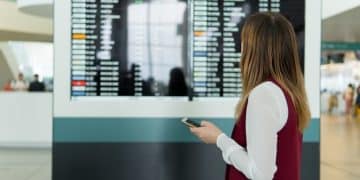Digital Nomad Essentials: Your Ultimate Guide to Remote Work Travel

Achieving true freedom and global exploration as a digital nomad requires mastering essential practices, from securing reliable remote work setups to understanding cultural nuances and optimizing financial strategies, ensuring a sustainable and enriching lifestyle abroad.
Embarking on the digital nomad journey promises a life of unparalleled freedom, cultural immersion, and professional growth. This lifestyle, however, isn’t simply about packing a suitcase and buying a one-way ticket; it demands meticulous planning, strategic resourcefulness, and a profound understanding of what makes remote work truly effective while traversing the globe. Unlocking the full potential of global travel while maintaining professional obligations hinges on mastering the core principles of Digital Nomad Essentials: The Ultimate Guide to Working Remotely While Traveling the World. This comprehensive guide aims to equip aspiring and seasoned digital nomads alike with the knowledge and tools necessary for a seamless and sustainable nomadic existence, moving beyond superficial wanderlust to embrace a truly integrated and fulfilling way of life.
Setting Up Your Mobile Office: Gear and Connectivity
The foundation of any successful digital nomad experience lies in a robust and reliable mobile office setup. This isn’t just about having a laptop; it encompasses a suite of tools and strategies designed to maintain productivity and connectivity regardless of your geographical location. Preparing your tech arsenal effectively minimizes disruptions, ensuring you can meet deadlines and communicate efficiently, even from the most remote corners of the world. Understanding the critical role of each piece of equipment and its implications for travel compatibility is paramount.
When selecting your core equipment, prioritize portability, durability, and functionality. A lightweight yet powerful laptop is your primary workstation, but consider its battery life and charging capabilities. Ergonomics, though often overlooked in a mobile setting, play a crucial role in long-term comfort and health. Accessories like a portable monitor or an external keyboard can significantly enhance productivity, turning a small cafe table into a fully functional workspace. Each item should be chosen with a clear purpose and an eye toward minimizing overall weight and bulk, without compromising on performance.
Essential Gear for the Productive Nomad
Having the right tools is non-negotiable for seamless remote work. These items form the backbone of your mobile operation, enabling you to remain productive and connected from anywhere.
- High-Performance Laptop: Invest in a reliable, lightweight laptop with strong processing power and excellent battery life. Consider models known for durability.
- Portable Monitor: A compact, USB-powered monitor can significantly boost productivity for tasks requiring more screen real estate.
- Noise-Canceling Headphones: Essential for focus in bustling environments and for clear communication on video calls.
- Portable Hard Drive/Cloud Storage: Redundant backup solutions are critical for protecting your work and important documents.
Beyond the primary devices, consider smaller accessories that streamline your workflow. A universal power adapter with multiple USB ports simplifies charging multiple devices. A compact surge protector can safeguard your electronics from inconsistent power grids, a common issue in many developing countries. Don’t underestimate the value of a high-quality, comfortable backpack designed to protect your electronics while distributing weight evenly.
Reliable Connectivity Solutions
Internet access is the lifeblood of digital nomadism. Without it, your mobile office is simply a collection of expensive gadgets. Diversifying your internet strategy is key to avoiding connectivity blackouts.
- Unlocked Smartphone with Local SIMs: The most common and often cheapest way to get regular internet access. Research local providers upon arrival.
- Portable Wi-Fi Hotspot: Provides a secure personal network, useful when public Wi-Fi is unreliable or nonexistent.
- VPN Service: Crucial for protecting your data on public networks and accessing geo-restricted content or services.
- Co-working Spaces/Cafes with Strong Wi-Fi: Always scope out reliable Wi-Fi locations in advance using dedicated apps or online communities.
Always have a backup plan for internet access. This might involve a secondary SIM card from a different provider, a pre-loaded portable hotspot, or knowing the nearest reliable co-working space. Regular speed tests are advisable to ensure the connection meets your work requirements, particularly for video calls or large file transfers. Understanding the local internet infrastructure before arrival can save significant time and frustration.
In essence, equipping yourself as a digital nomad involves more than just buying electronics; it’s about curating a flexible, resilient, and efficient mobile workspace. Each piece of gear and connectivity strategy should align with your work demands and anticipated travel environments, enabling you to remain productive and connected regardless of where your adventures take you.

Choosing Your Base: Destinations and Accommodation
The choice of where to live and work as a digital nomad is as crucial as the work itself. It encompasses not only the allure of new landscapes and cultures but also the practicalities of visas, cost of living, safety, and community. A thoughtful selection of your base ensures not just a vibrant experience, but also a conducive environment for sustained productivity and well-being. This decision often involves balancing the romantic ideal of travel with the pragmatic demands of a professional life.
Researching potential destinations goes beyond tourist brochures. Delve into the local cost of living for housing, food, transportation, and entertainment. Consider the quality of infrastructure, particularly internet stability and power grid reliability. Safety and political stability are paramount, as is the local attitude towards foreigners. Understanding the visa requirements and length of stay permitted is fundamental, as is the ease of extending visas or finding long-term stay options. The ideal destination should foster both personal enrichment and professional efficiency.
Popular Digital Nomad Hubs
Certain cities and countries have emerged as favored destinations due to their specific advantages for remote workers. These hubs often offer a thriving expat community, excellent infrastructure, and a relatively low cost of living.
- Lisbon, Portugal: Known for its vibrant culture, affordable living, and dedicated digital nomad visa.
- Chiang Mai, Thailand: A long-standing favorite for its low cost of living, strong community, and focus on wellness.
- Medellin, Colombia: Offers a pleasant climate, friendly locals, and a growing tech scene, alongside affordable prices.
- Bali, Indonesia: Famous for its spiritual atmosphere, thriving expat community, and beautiful landscapes, though internet can be variable.
These locations often have established co-working spaces, a network of services catering to foreigners, and a high concentration of like-minded individuals. However, even within popular hubs, nuances exist. Research specific neighborhoods, local transportation options, and the availability of amenities important to your lifestyle, such as gyms, healthy food options, or specific cultural interests.
Accommodation Strategies
Securing suitable accommodation is a cornerstone of a comfortable digital nomad life. Your choice depends on your budget, desired level of privacy, and length of stay. Flexibility and adaptability are essential.
- Co-living Spaces: Integrate accommodation with a community and often includes shared workspaces and organized events.
- Airbnb/Short-Term Rentals: Offers flexibility for varying lengths of stay, providing a home-like environment. Useful for testing out new locations.
- Hostels with Private Rooms: Budget-friendly option, often with social opportunities, but privacy can be limited.
- Long-Term Apartment Rentals: More stable and cost-effective for stays of several months or more, but requires more commitment.
Always prioritize locations with reliable internet. Read reviews carefully, especially regarding Wi-Fi speed and noise levels. Negotiating for longer stays can often result in significant discounts. Consider using platforms tailored specifically for digital nomads, which often list properties with good workspaces and stable internet connections. A good accommodation provides not just a roof over your head, but a conducive environment for both work and rest.
Ultimately, selecting your digital nomad base involves a blend of dreams and practicality. By thoroughly researching destinations and adopting a flexible approach to accommodation, you can create a stable yet adventurous foundation for your remote work travels, ensuring that your environment supports both your professional goals and your personal aspirations for exploration.
Financial Acumen: Budgeting and Income Streams
Financial stability is the bedrock of a sustainable digital nomad lifestyle. Without a clear understanding of your income streams and a disciplined approach to budgeting, the dream of remote work and travel can quickly turn into a stressful reality. This section focuses on equipping you with the monetary tools and knowledge necessary to not only survive but thrive while adventuring globally. It goes beyond simply having savings; it’s about creating a resilient financial ecosystem that supports a nomadic existence.
The core of financial acumen for digital nomads revolves around two pillars: consistent income and meticulous expense tracking. Relying on a single client or income source can be precarious. Diversifying your income, whether through multiple clients, passive income streams, or a combination of both, builds a safety net. Simultaneously, understanding exactly where your money goes is crucial for making informed decisions about your spending and travel pace. This proactive financial management significantly reduces stress and extends your travel capabilities.
Securing and Diversifying Income
A diversified income portfolio offers security and flexibility, essential for the unpredictable nature of remote work and travel.
- Freelance Platforms: Websites like Upwork, Fiverr, and Freelancer connect you with clients globally for various skills.
- Direct Client Acquisition: Build a portfolio and network to secure long-term clients independently, often leading to better rates.
- Passive Income Streams: Consider investments, affiliate marketing, or digital products, which require initial effort but can generate income while you sleep.
- Consulting/Coaching: Leverage your expertise to offer high-value services to individuals or businesses.
Always maintain a professional approach to your work. Clear contracts, timely deliverables, and excellent communication build strong client relationships and word-of-mouth referrals. For international payments, research platforms that offer favorable exchange rates and low fees, such as Wise (formerly TransferWise) or Payoneer, to maximize your earnings. Having a buffer savings account equal to at least 3-6 months of expenses is highly advisable.
Mastering Your Budget and Expenses
Effective budgeting is not about deprivation, but about prioritization and awareness. It allows you to make conscious choices about your spending, ensuring your travel aligns with your financial capacity.
- Track Everything: Use apps like Mint, YNAB, or even a simple spreadsheet to categorize every expense.
- Set Daily/Weekly/Monthly Budgets: Based on your income and desired lifestyle, allocate funds for accommodation, food, transport, and leisure.
- Local Currency Awareness: Understand exchange rates and local costs intimately to avoid overspending due to unfamiliarity.
- Emergency Fund: Maintain a dedicated fund for unexpected medical issues, visa complications, or last-minute travel changes.
Beyond tracking, actively seek ways to reduce costs while traveling. This could involve cooking more meals, using public transportation, seeking out free activities, or negotiating better rates for long-term accommodation. The digital nomad lifestyle often offers opportunities for a lower cost of living than in many home countries, but only if managed wisely. By integrating comprehensive income strategies with diligent budgeting, digital nomads can achieve a level of financial freedom that supports sustained exploration and professional growth, truly living without borders.
Health and Wellness on the Road
Maintaining health and wellness as a digital nomad is not a luxury; it’s a fundamental requirement for a sustainable and enjoyable lifestyle. The constant movement, exposure to new environments, and varied routines can take a toll if not proactively managed. This section transcends basic health advice to address the unique challenges faced by those who work and travel simultaneously, emphasizing comprehensive well-being that includes physical, mental, and emotional health. Your health is your most valuable asset when exploring the world.
The nomadic life presents distinct health considerations. Access to healthcare can vary wildly between countries, and familiar routines are often disrupted. Proactive measures, from preventative care to robust travel insurance, are essential. Equally important is cultivating habits that support mental resilience amidst uncertainty and cultural shifts. A holistic approach ensures that you remain invigorated and capable of handling both work demands and travel adventures, rather than falling prey to burnout or illness.
Navigating Healthcare and Insurance Globally
Access to medical care and financial protection against health emergencies are critical concerns for digital nomads.
- Travel Insurance: Invest in comprehensive travel insurance that covers medical emergencies, evacuation, and trip interruptions specifically designed for long-term travelers.
- Telemedicine Services: Explore virtual healthcare platforms that allow you to consult doctors remotely, often useful for minor ailments or prescription refills.
- Research Local Healthcare: Before arriving, understand the quality of local medical facilities and the process for obtaining care, including emergency services.
- Vaccinations and Preventative Meds: Consult a travel doctor well in advance of your trip for recommended vaccinations and any necessary prophylactic medications.
Always carry a copy of your insurance information, important medical records (translated if necessary), and a list of current medications with their generic names. Over-the-counter medications that you commonly use might not be available or have different names abroad, so consider bringing a small supply. Understand the terms of your insurance policy, especially regarding pre-existing conditions and country-specific exclusions.
Prioritizing Mental and Physical Well-being
Beyond formal healthcare, daily practices for physical and mental well-being are paramount for a thriving nomad experience.
- Consistent Routines: Establish adapted work and sleep schedules, even when changing time zones, to maintain rhythm and stability.
- Nutrition and Hydration: Make conscious efforts to eat balanced meals, prioritize fresh produce, and stay well-hydrated, especially in new climates.
- Regular Exercise: Incorporate physical activity into your daily life, whether it’s exploring a city on foot, finding local gyms, or practicing yoga.
- Building Community: Actively seek out social connections through co-working spaces, expat groups, or local activities to combat loneliness and foster a sense of belonging.
The mental toll of constant movement and novel environments should not be underestimated. Be mindful of symptoms of burnout or isolation. Practice mindfulness, pursue hobbies, and ensure you allocate time for genuine rest and rejuvenation. Don’t hesitate to seek professional help if mental health challenges arise; many therapists now offer online sessions. By proactively managing health and wellness, digital nomads can ensure their journey is not just adventurous, but also sustainable and fulfilling, allowing them to fully embrace both work and wanderlust.

Legal and Administrative Landscape: Visas, Taxes, and Compliance
Navigating the legal and administrative complexities of being a digital nomad is perhaps one of the most challenging, yet critical, aspects of this lifestyle. Without proper attention to visas, taxes, and local regulations, what begins as an adventurous pursuit can quickly devolve into legal complications or financial penalties. This section provides a strategic overview of how to remain compliant with international laws and manage your administrative responsibilities, ensuring that your global travels are both exciting and legally sound. It demands a proactive and informed approach, as rules can vary drastically from one country to another.
The foundation of legal compliance for digital nomads rests on understanding three key areas: immigration status, tax obligations, and business registration. Each country has unique requirements, and what works in one jurisdiction may not apply in another. Ignoring these aspects carries significant risks, including deportation, heavy fines, or even imprisonment. Therefore, treating these administrative tasks with the same diligence as your work clients is imperative. This often requires professional advice, given the intricacies of international law.
Visa Requirements and Immigration Status
Your ability to legally reside and work in a foreign country is fundamentally tied to your visa status. This is not static and requires careful planning for each destination.
- Tourist Visas: Most common, but generally do not permit work. Often suitable for short trips where work is incidental and not directly for a local entity.
- Digital Nomad Visas: A growing number of countries offer specific visas for remote workers, granting legal residency and work rights for extended periods. (e.g., Portugal, Spain, Croatia).
- Business Visas: May apply if you’re traveling for specific business meetings or conferences, but typically not for sustained remote work.
- Research and Plan Ahead: Always check the specific visa requirements for each country you plan to visit, including processing times and required documentation.
Overstaying a visa or working illegally can lead to severe consequences, including bans from re-entering certain countries. Consider the length of your intended stay and whether a “visa run” is a viable option for shorter visits. For longer stays, actively pursuing a digital nomad visa can provide immense peace of mind and access to local services.
Tax Implications and Financial Compliance
Taxation for digital nomads is complex due to varying residency rules and taxation treaties. Ignorance is not a defense, and proper planning can prevent significant financial burdens.
- Tax Residency: Understand what constitutes tax residency in your home country and in any country where you spend significant time. This determines where you owe taxes.
- Foreign Earned Income Exclusion (FEIE): For US citizens, this exclusion can significantly reduce tax burden on income earned abroad if specific physical presence tests are met.
- Income Tax Treaties: Bilateral agreements between countries that help prevent double taxation. Consult these resources.
- Seek Professional Advice: Engage an accountant or tax professional specializing in international taxation for digital nomads. This is crucial for compliance.
Keep meticulous records of your income, expenses, and travel dates. Digital nomads may need to file taxes in their home country, the country where they earn income, or both. Failure to comply can result in severe penalties. Understand the difference between where you are tax resident and where you may be physically present. This often requires navigating complex rules that dictate where income is sourced and where it is taxed.
Business Registration and Local Regulations
Depending on your business structure and the nature of your work, local regulations can significantly impact your operations.
- Business Registration: Determine if you need to register your business in any foreign country where you operate, even if only remotely.
- Local Labor Laws: Be aware of any local labor laws that might apply if you interact with local clients or contractors.
- Bank Accounts: Consider opening local bank accounts for ease of transactions and to avoid foreign transaction fees, but be aware of reporting requirements.
Maintaining clear documentation of your business operations, contracts, and financial transactions is paramount. As a digital nomad, you are essentially running a global business, and treating it with the corresponding professional diligence is vital. By proactively addressing visa requirements, understanding tax obligations, and complying with local business regulations, digital nomads can ensure their travels are not only limitless but also legally sound, allowing for stress-free exploration and sustained professional success.
Building Community and Networking Abroad
While the allure of individual freedom is strong for digital nomads, true long-term success and well-being often hinge on the ability to connect with others. Building community and networking abroad are not merely social endeavors; they are critical for emotional support, professional opportunities, and cultural integration. Isolation can be a significant challenge in a constantly changing environment, making deliberate efforts to connect with like-minded individuals and locals indispensable. This section highlights strategies for fostering meaningful relationships and leveraging networks to enhance both your personal life and professional trajectory while on the move.
The transient nature of digital nomadism means that relationships can be fleeting. However, by intentionally seeking out specific types of communities and engaging authentically, you can cultivate a robust support system. This could involve fellow remote workers who understand your unique challenges, locals who offer insights into the culture, or even professional contacts that lead to new collaborations. Successful networking abroad is about giving as much as receiving, building genuine connections that enrich your journey.
Finding Your Tribe: Digital Nomad Communities
Specific platforms and locations cater to the global community of remote workers, making it easier to find your “tribe.”
- Co-working Spaces: Natural hubs for meeting other digital nomads; many organize social events and workshops.
- Online Forums and Facebook Groups: Platforms like “Digital Nomads Around the World” provide a place to ask questions, share tips, and organize meetups.
- Meetup.com and Local Events: Search for specific interest groups, from language exchanges to hiking clubs, to connect with a diverse range of people.
- Co-living Programs: Designed to foster community among remote workers living together for a defined period.
Be proactive in attending events and initiating conversations. Small talk can lead to deep friendships or valuable professional connections. Remember that everyone is in a similar situation, often looking for connection, so overcoming initial shyness can lead to significant rewards. Sharing experiences and challenges common to the nomadic lifestyle helps build instant rapport and lasting bonds.
Professional Networking and Collaboration
Networking isn’t just for job seekers; for digital nomads, it’s about expanding your client base, finding collaborators, and staying abreast of industry trends.
- Industry-Specific Events: Attend online webinars or in-person conferences related to your field, even when abroad.
- LinkedIn: Leverage this platform to connect with professionals in your industry, both locally and globally.
- Referral Networks: Build strong relationships with other freelancers who may refer clients to you or with whom you can collaborate on larger projects.
- Local Business Meetups: If relevant to your niche, explore local business groups that welcome international members.
Always carry business cards or have an easy way to share your contact information and professional portfolio. Be clear about your skills and availability. Networking for digital nomads is often less about direct job hunting and more about building a web of professional relationships that can lead to unforeseen opportunities and mutual support. By actively engaging with global communities and professional networks, digital nomads can overcome potential isolation, gain new perspectives, and unlock unforeseen personal and career pathways, ensuring a rich and connected journey.
Staying Accountable and Productive Remotely
The allure of digital nomadism often lies in the freedom it affords, but with freedom comes the significant responsibility of self-management. Staying accountable and productive while constantly changing environments is a nuanced challenge, requiring discipline, effective time management, and the ability to adapt your work habits. Without structure, the exciting novelty of travel can quickly erode productivity, jeopardizing client relationships and income streams. This section delves into practical strategies and mindset shifts necessary to maintain a high level of professional output, no matter where your journey takes you.
Successful remote productivity for digital nomads is a delicate balance of personal initiative and digital tools. It’s about creating a consistent work ethic amidst inconsistency. This involves setting clear boundaries between work and leisure, cultivating self-discipline, and leveraging technology to streamline tasks and communication. The most effective digital nomads master the art of making their work fit seamlessly into their travel aspirations, rather than allowing one to detract from the other.
Establishing Effective Work Routines
Consistency is key, even when your environment isn’t. Crafting and adhering to a flexible yet firm work routine is paramount.
- Designated Work Times: Set specific hours each day for work, treating them as non-negotiable appointments.
- Dedicated Workspace: Create a physical separation between your work and leisure areas, even if it’s just a specific corner of a room or a table in a co-working space.
- Time Zone Management: Be mindful of client time zones and schedule calls/deadlines accordingly. Communicate your availability clearly.
- Regular Breaks: Integrate short, strategic breaks to avoid burnout and maintain focus throughout the day.
Start your day with your most important tasks to build momentum. Avoid the temptation to work from your bed or in distracting environments. Inform your clients of your travel plans and potential time zone differences well in advance to manage expectations. Regularly review your productivity levels and adjust your routine as needed, recognizing that what works in one location may need tweaking in another.
Utilizing Productivity Tools and Strategies
A suite of digital tools and proven strategies can significantly enhance your remote work efficiency.
- Project Management Software: Tools like Asana, Trello, or Monday.com help organize tasks, deadlines, and team collaborations.
- Communication Platforms: Slack, Zoom, or Google Meet facilitate seamless team communication and virtual meetings.
- Website Blockers/Focus Apps: Use tools that block distracting websites or apps during work hours to maintain concentration.
- Pomodoro Technique: Work in focused 25-minute sprints followed by short breaks to improve concentration and prevent fatigue.
Beyond tools, cultivate a mindset of continuous improvement and self-awareness. Recognize when you’re most productive and schedule your demanding tasks for those times. Learn to say no to distractions, both digital and environmental. Regularly assess your workflow for inefficiencies and experiment with new methods to optimize your output. By consciously structuring their work life, leveraging essential tools, and maintaining a disciplined approach, digital nomads can successfully merge their professional obligations with their desire for global exploration, demonstrating that freedom and productivity are not mutually exclusive.
| Key Point | Brief Description |
|---|---|
| 💻 Essential Gear | Portable, durable tech (laptop, headphones) and robust connectivity (local SIMs, VPN) are crucial for remote work on the go. |
| 🌍 Destination Choice | Select locations based on visa options, cost of living, safety, infrastructure, and community for a conducive work environment. |
| 💰 Financial Mastery | Diversify income streams, budget meticulously, and maintain an emergency fund to ensure financial stability while traveling. |
| 🧘♀️ Health & Wellness | Prioritize comprehensive travel insurance, preventive healthcare, consistent routines, and social connections for well-being. |
Frequently Asked Questions About Digital Nomad Essentials
▼
While a powerful, reliable laptop is indispensable, the most crucial “gear” is often a strong and consistent internet connection. Without it, even the best laptop is useless for remote work. This emphasizes the need for comprehensive connectivity strategies, including local SIM cards, portable hotspots, and VPNs, rather than relying solely on public Wi-Fi networks that might be unreliable or insecure.
▼
Taxation for digital nomads is complex and depends heavily on tax residency rules and bilateral tax treaties. Many US digital nomads utilize the Foreign Earned Income Exclusion (FEIE) if they meet specific physical presence tests abroad. It’s crucial to understand where you are considered a tax resident and seek professional advice from an international tax accountant to ensure compliance and avoid double taxation. Proper record-keeping of income and travel dates is vital.
▼
Yes, comprehensive travel insurance is absolutely necessary for digital nomads. Standard health insurance often doesn’t cover international medical emergencies or long-term travel. Policies specifically designed for digital nomads cover medical care, emergency evacuation, trip interruptions, and sometimes even lost luggage or electronics. It provides a crucial safety net against unforeseen circumstances that can be financially devastating if uninsured, offering peace of mind.
▼
Maintaining productivity as a digital nomad requires discipline and strategic planning. Key strategies include establishing consistent work routines, even with changing time zones, designating specific work areas to create boundaries, and leveraging productivity tools like project management software and focus apps. Prioritizing tasks, communicating clear availability to clients, and taking regular breaks also contribute significantly to sustained efficiency and preventing burnout.
▼
Building community is vital to combat loneliness and foster support. Digital nomads often connect through co-working spaces, which naturally facilitate interaction, as well as online forums and social media groups dedicated to remote workers. Attending local meetups, joining co-living programs, and engaging in hobbies or classes also provide excellent opportunities to meet both fellow nomads and locals, fostering meaningful connections for work and leisure.
Conclusion
The journey of a digital nomad, while inherently liberating and enriching, is not without its complexities. It demands a holistic approach that blends wanderlust with pragmatic preparation. From meticulously selecting your mobile office gear and securing reliable connectivity to mastering your finances, navigating legal landscapes, prioritizing your well-being, and building supportive communities, each essential contributes to a sustainable and fulfilling nomadic existence. By embracing these core principles, aspiring and established digital nomads can transform the dream of global remote work into a tangible, thriving reality, ensuring that their travels are not just fleeting adventures, but a deeply integrated and successful way of life.





